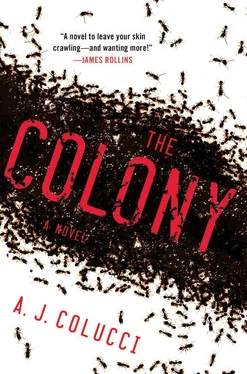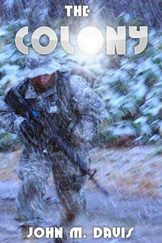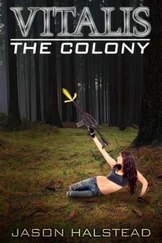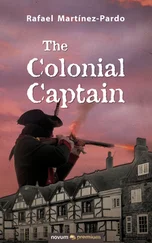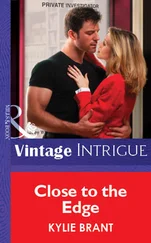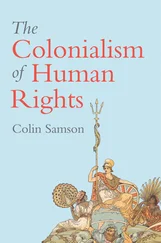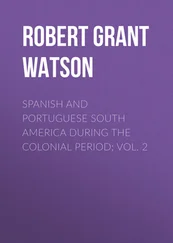They reached an enormous intersection by the Queens Midtown Tunnel where throngs of pedestrians clambered over cars and buses that clogged the arched entrance. Along the skyline, smoke poured from tall building fires as if from burning matchsticks. A fleet of military choppers were flying through the smoke and landing somewhere in Central Park.
Paul and Kendra reached Thirty-sixth Street and found a long stretch of old brick residential buildings.
“These look like ant hotels to me,” she whispered.
“So we sneak up on them?” Paul asked.
“Just close enough to grab a queen,” she answered. “Before they tear us apart.”
“No way,” Paul said confidently. “These suits are top of the line. Jack the Ripper couldn’t get through.
She raised a brow. “Think so, huh?”
“Maybe.”
“I just wish we had some kind of warning.”
“Perhaps we do. Some of the survivors say the ants make a chirping noise.”
“Ants don’t make audible sounds.”
“Maybe it has something to do with how they signal attack.”
“Or maybe they bred them with crickets.”
“Listen.” He paused and they heard a muffled tapping. Paul orbited his flashlight around the empty street. “Let’s not spook ourselves. What were we talking about?”
“Our plan.”
“Right. Find the best building and check out the most likely nesting spots.”
“So, what’s the best building?”
“I suppose whichever one has the most bodies around.”
Washington, D.C.
IT WAS A FORTY-FIVE-MINUTE helicopter ride from the United Nations to the White House lawn.
General Dawson and Colonel Garrett were to lead an emergency meeting in the situation room at 3:00 A.M. Gathered around the table were President Andrew Davis, Attorney General Joseph Hastings, White House Chief Counsel George Bennington, Cabinet members and Joint Chiefs of Staff, the heads of Homeland Security, along with majority and minority party leaders.
In front of each person was a black bound report lettered in red: OPERATION COLONY TORCH. The president and attorney general sat beside each other, red-faced and flipping through pages while Colonel Garrett summarized damage, projected casualties and estimated worst-case scenarios. Garrett’s mission was to get everyone in the room thinking alike. The ants in Manhattan could never leave the island. The lives of 300 million Americans were at stake. The colony had to be contained.
Both Garrett and Dawson had agreed that Kendra’s pheromone formula would not be mentioned at the meeting. It was too much of a long shot and could delay approval of Operation Colony Torch.
Hastings would be a tough sell. He was known as the president’s Doberman, guardian of the administration. Any proposal that showed the slightest trace of controversy was sniffed out by Hastings and snapped off with ruthless jaws. The election year was fast approaching and the president’s ratings were dropping even faster, ever since the ant attacks in New York. Something drastic had to be done, but as far as Hastings was concerned, Operation Colony Torch was political suicide. “Who the hell are you!” he bellowed at Garrett. “I don’t even know you.” He turned to the president. “These guys walk in here, tell us some South American secret weapon has gotten loose in New York and they want this administration to clean up their colossal mess?”
President Davis was pensively leaning back in his chair, hands steepled under his chin. “I think we’re past the blame game, Joe. We have to take some kind of action.”
Hastings was furious and vowed that he would die or be the last voice of reason. He slid his copy of the report to the center of the table and sternly reproached the two army officers. “Let me say this: even the suggestion of using nuclear weapons on our own country may be grounds for treason. You’d better have a damn good reason for recommending such an undertaking.”
The statement was followed by a lot of head nodding.
Dawson cringed at the monumental task in front of him. He barely had the support of his own colleagues at the Pentagon. No one wanted to touch this with a nine-hundred-foot pole. His fellow generals and commanders had jumped into action, focusing on evacuation, flying in supplies and medical needs, but no one wanted to be involved in the containment.
Just hours before, Secretary of State Howard Sherwood was fuming that Dawson had put Garrett in charge of the operation: “You put a colonel in charge of coordinating logistics, coming up with a plan and recommendations to save America’s greatest city?”
Dawson cringed at having to defend Garrett, but he was knee deep in the turmoil with no allies. “Colonel Garrett has more knowledge about these ants than anyone. Frankly, we need him.”
Garrett addressed the group with confidence, summing up the first section of the report, which explained that no other means of destroying the ants besides nuclear bombs had been discovered.
Hastings called for an immediate motion to bring the discussion to the Senate floor. “We need to get approval from the proper channels and clear this with both the UN Commission and the Atomic Energy Agency in Vienna. The president needs documentation, very detailed documentation, outlining all our options. At the very least it will take a week to get clearance on even considering your proposal.”
“You don’t seem to understand,” the general stressed, “We don’t have a week. We don’t have a day. These ants are moving quickly. Even if we blow up the bridges and tunnels, there are juvenile queens ready to take flight. They can fly thousands of miles. The ants can cross water by joining together and making huge balls that carry them downstream, possibly across rivers or even oceans.”
Senator Denise Sheldon of New York slammed both her hands on the table. “New York City!” she shouted at the general. “The most densely populated county in the nation. The financial and cultural capital of the world. Home to the New York Stock Exchange, NASDAQ, Madison Square Garden, Lincoln Center—not to mention outstanding museums and universities, along with nearly every major radio and television station, newspaper and magazine.” She was going to make a show of this and there was nothing stopping her. “Times Square. Greenwich Village. Central Park. These are places known by every person in civilized society. You’re talking about New York City, damn it!”
Garrett shot back, “No, ma’am! Excuse me, ma’am, but it is not New York City. It’s Siafu Moto City. These insects have taken over, with no plans of ever leaving.”
The outburst was startling and the group stopped breathing as Garrett’s eyes scanned the table. “Each of you must understand that we will never save Manhattan. Our only option is bomb it now or bomb it later. You need to start thinking about saving Long Island, New Jersey, Connecticut and the rest of the nation.” This was Garrett’s stage moment. He was enjoying this, Dawson could tell, and he was revolted. The colonel had the floor and scrutinized each worried face, speaking in a patronizing tone, “This is one city, in one nation, on one planet. Right now, we have to consider the only feasible action to save the United States of America—and beyond.”
There was a period of silence, and then the president cleared his throat and asked, “How many casualties are we talking about?”
Garrett flipped opened his black folder, but kept his eyes locked on the commander in chief. “There are approximately one hundred and forty thousand people already dead from the ant attacks. Out of the three million commuters and tourists, almost all of them have left the city. Out of the one point six million residents, there are roughly one hundred thousand left. Most have gotten out on their own, by train or foot, by bridge and tunnel, fleets of ships and helicopters. We are still evacuating at a rate of twenty-six thousand civilians per hour. Hospital workers, doctors, nurses and patients, emergency crews, police and military will be the last to leave.”
Читать дальше
